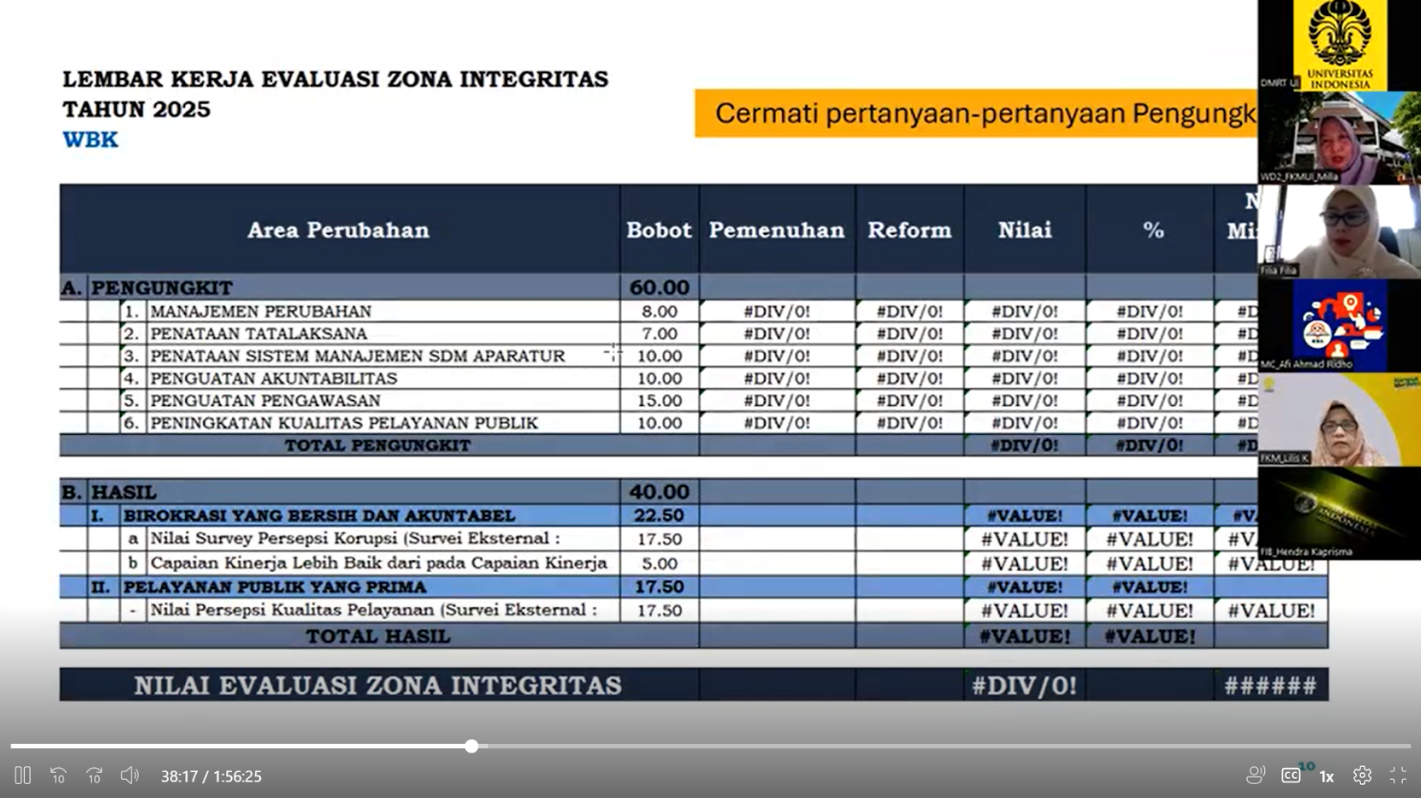The Faculty of Public Health (FPH) Universitas Indonesia (UI) served as a key speaker in the online Socialization of the Integrity Zone (IZ) Evaluation Worksheet (LKE) held by UI on Thursday, June 5, 2025. This event is part of UI’s initiative to strengthen Integrity Zone development in accordance with the Ministry of Administrative and Bureaucratic Reform Regulation (Permenpan RB) No. 90 of 2021 on the development of Integrity Zones towards Corruption-Free Zones (WBK) and Clean and Serving Bureaucratic Zones (WBBM). The activity aimed to prepare UI’s work units and faculties to implement integrity values in improving governance and enhancing the quality of public services for the academic community and service users. The session was attended by university leaders, including deans, vice deans, and representatives from various faculties at UI.
Prof. Dr. Rizal E. Halim, S.E., M.E., Head of UI’s Quality Assurance and Internal Oversight Agency, delivered opening remarks and officially launched the event. He expressed appreciation for FPH UI, which has already earned an Integrity Zone title. “Developing Integrity Zones is an integral part of the UI Rector’s strategic plan for 2024–2029 to strengthen governance and transform bureaucratic culture. Through the IZ program, we aim to create more efficient, effective, and service-oriented innovations,” said Prof. Rizal. He also expressed hope that this year at least seven faculties at UI would register and qualify for the IZ program conducted by the Ministry of Administrative and Bureaucratic Reform.
Dr. Milla Herdayati, S.K.M., M.Si., Vice Dean for Resources, Ventures, and General Administration of FPH UI, presented material on filling out the IZ Evaluation Worksheet. In her presentation, Dr. Milla explained that the Integrity Zone is a recognition given to government institutions, including universities, whose leadership and staff are strongly committed to building a work environment free from corruption and characterized by a service-oriented bureaucracy. The core goal of the IZ development is to deliver public services that are fast, accurate, affordable, safe, and easily accessible, while serving as a crucial tool to fulfill the institution’s vision and mission. This is what sets it apart from academic program accreditation, which focuses more on academic quality improvement.
“Key components evaluated in the IZ development include change management, operational procedures, human resource management systems, supervision and accountability, as well as improvements in the quality of public service delivery,” Dr. Milla explained. In addition, the outcomes of IZ implementation are assessed through anti-corruption perception surveys, performance achievements, and public service perception surveys.
Regarding the technical aspects of completing the 2025 IZ Evaluation Worksheet, Dr. Milla emphasized the importance of carefully reviewing each question, weight, and criteria. “Developing informative narratives that meet the assessment criteria, supported by relevant and structured evidence, can lead to higher scores from the evaluation team. Supporting evidence should be coded, directly embedded in the narrative, and clearly labeled to facilitate traceability,” said Dr. Milla. She also recommended compiling documents such as invitations, attendance lists, materials, and documentation into one thematic file and being selective in choosing photo evidence to effectively support the narrative.
FPH UI began its journey toward WBK/WBBM status in 2019 and was officially designated as an IZ WBK unit in 2021. Since then, the faculty has maintained continuous improvement as part of its long-term commitment to bureaucratic reform. The strategies adopted by FPH UI include strengthening commitment and mindset transformation, enhancing service accessibility and transparency, implementing community-impact programs, consistent monitoring and evaluation, and proactive, strategic media management.
Nelasari, S.K.M., M.K.M., Secretary of the Faculty, also delivered a presentation on the implementation of enabler components in Integrity Zone development. She emphasized the importance of structuring operational procedures to increase efficiency and effectiveness through clear, measurable, and accessible systems and workflows. Additionally, FPH UI has introduced various innovations in public service. “FPH UI’s flagship innovations include the Faculty Service Unit (ULF), Performance Information System (SISKA), E-Complaint digital complaint service, Griseta educational platform, and the Stunting Resource Center as an information hub for stunting prevention efforts,” explained Nelasari. All these initiatives reflect FPH UI’s commitment to realizing a Corruption-Free Zone (WBK) and a Clean and Serving Bureaucratic Zone (WBBM) through professional, transparent, and stakeholder-responsive governance.
FPH UI’s role as a speaker demonstrates UI’s trust in the faculty’s commitment and tangible achievements in developing Integrity Zones. FPH UI’s success in attaining the IZ title reinforces UI’s position as a leader in bureaucratic reform among higher education institutions. This synergy serves as solid proof that UI and FPH UI are ready to deliver clean, professional, and impactful public services. (DFD)

